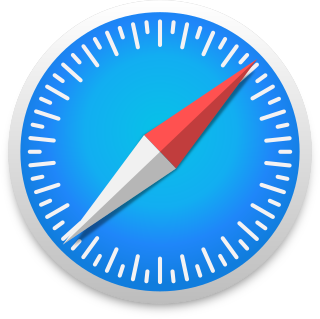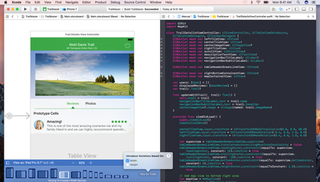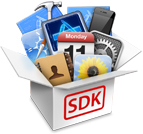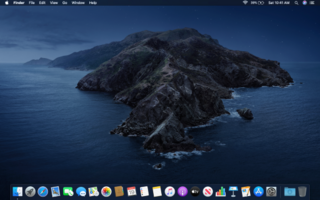macOS is a series of proprietary graphical operating systems developed and marketed by Apple Inc. since 2001. It is the primary operating system for Apple's Mac computers. Within the market of desktop, laptop and home computers, and by web usage, it is the second most widely used desktop OS, after Microsoft Windows.

macOS Server, formerly named Mac OS X Server and OS X Server, is a discontinued, stand-alone server operating system by Apple Inc.. It is also the name of its replacement software, an operating system addition, for macOS that provides additional server programs along with management and administration tools for iOS and macOS.
The history of macOS, Apple's current Mac operating system originally named Mac OS X until 2012 and then OS X until 2016, began with the company's project to replace its "classic" Mac OS. That system, up to and including its final release Mac OS 9, was a direct descendant of the operating system Apple had used in its Macintosh computers since their introduction in 1984. However, the current macOS is a Unix operating system built on technology that had been developed at NeXT from the 1980s until Apple purchased the company in early 1997.

Safari is a graphical web browser developed by Apple, based on the WebKit engine. First released on desktop in 2003 with Mac OS X Panther, a mobile version has been bundled with iOS devices since the iPhone's introduction in 2007. Safari is the default browser on Apple devices. A Windows version was available from 2007 to 2012.

Xcode is an integrated development environment (IDE) for macOS containing a suite of software development tools developed by Apple for developing software for macOS, iOS, iPadOS, watchOS, and tvOS. It was first released in 2003; the latest stable release is version 12.1, released on October 20, 2020, and is available via the Mac App Store free of charge for macOS Catalina users. Registered developers can download preview releases and prior versions of the suite through the Apple Developer website. Xcode includes Command Line Tools (CLT), which enable UNIX-style development via the Terminal app in macOS. They can also be downloaded and installed without the main IDE.

VLC media player is a free and open-source, portable, cross-platform media player software and streaming media server developed by the VideoLAN project. VLC is available for desktop operating systems and mobile platforms, such as Android, iOS, iPadOS, Tizen, Windows 10 Mobile and Windows Phone. VLC is also available on digital distribution platforms such as Apple's App Store, Google Play and Microsoft Store.

Internet Explorer for Mac OS X is a discontinued proprietary web browser developed by Microsoft for the Macintosh platform to browse web pages. Initial versions were developed from the same code base as Internet Explorer for Windows. Later versions diverged, particularly with the release of version 5 which included the cutting edge, fault-tolerant and highly standards-compliant Tasman layout engine.

Stevenote is a colloquial term for keynote speeches given by Steve Jobs, former CEO of Apple, at events such as the Apple Worldwide Developers Conference, Macworld Expo, and Apple Expo. Because most Apple product releases were first shown to the public at these keynotes, "Stevenotes" caused substantial swings in Apple's stock price.

The history of iTunes started in 2001. Initially conceived of as a simple music player, over time iTunes developed into a sophisticated multimedia content manager, hardware synchronization manager and e-commerce platform. iTunes enables users to manage media content, create playlists, synchronize media content with handheld devices including the iPod, iPhone, and iPad, re-image and update handheld devices, stream Internet radio and purchase music, films, television shows, and audiobooks via the iTunes Store.

Mac OS X Snow Leopard is the seventh major release of Mac OS X, Apple's desktop and server operating system for Macintosh computers.

iOS is a mobile operating system created and developed by Apple Inc. exclusively for its hardware. It is the operating system that powers many of the company's mobile devices, including the iPhone and iPod Touch; it also powered the iPad until the introduction of iPadOS, a derivative of iOS, in 2019. It is the world's second-most widely installed mobile operating system, after Android. It is the basis for three other operating systems made by Apple: iPadOS, tvOS, and watchOS. It is proprietary software, although some parts of it are open source under the Apple Public Source License and other licenses.

The iOS SDK, formerly the iPhone SDK, is a software development kit (SDK) developed by Apple Inc. The kit allows for the development of mobile apps on Apple's iOS operating system.
The App Store is a digital distribution platform, developed and maintained by Apple Inc., for mobile apps on its iOS & iPadOS operating systems. The store allows users to browse and download apps developed with Apple's iOS software development kit. Apps can be downloaded on the iPhone smartphone, the iPod Touch handheld computer, or the iPad tablet computer, and some can be transferred to the Apple Watch smartwatch or 4th-generation or newer Apple TVs as extensions of iPhone apps.

Mac OS X Lion is the eighth major release of Mac OS X, Apple's desktop and server operating system for Macintosh computers.
The following outline is provided as an overview of and topical guide to Apple Inc.:

OS X Mavericks is the tenth major release of OS X, Apple Inc.'s desktop and server operating system for Macintosh computers. OS X Mavericks was announced on June 10, 2013, at WWDC 2013, and was released on October 22, 2013 worldwide.

OS X Yosemite is the eleventh major release of OS X, Apple Inc.'s desktop and server operating system for Macintosh computers.

macOS Mojave is the fifteenth major release of macOS, Apple Inc.'s desktop operating system for Macintosh computers. Mojave was announced at Apple's Worldwide Developers Conference on June 4, 2018, and was released to the public on September 24, 2018. The operating system's name refers to the Mojave Desert and is part of a series of California-themed names that began with OS X Mavericks. It succeeded macOS High Sierra and was followed by macOS Catalina.

macOS Catalina is the sixteenth and current major release of macOS, Apple Inc.'s desktop operating system for Macintosh computers. It is the successor to macOS Mojave and precedes macOS Big Sur, which is planned to be released later in 2020. It was announced at WWDC 2019 on June 3, 2019, and was released to the public on October 7, 2019. Catalina is the first version of macOS to support only 64-bit applications and the first to include Activation Lock. It is the last version of macOS to have the version number prefix of 10, as the next release, Big Sur, is version 11.0.















